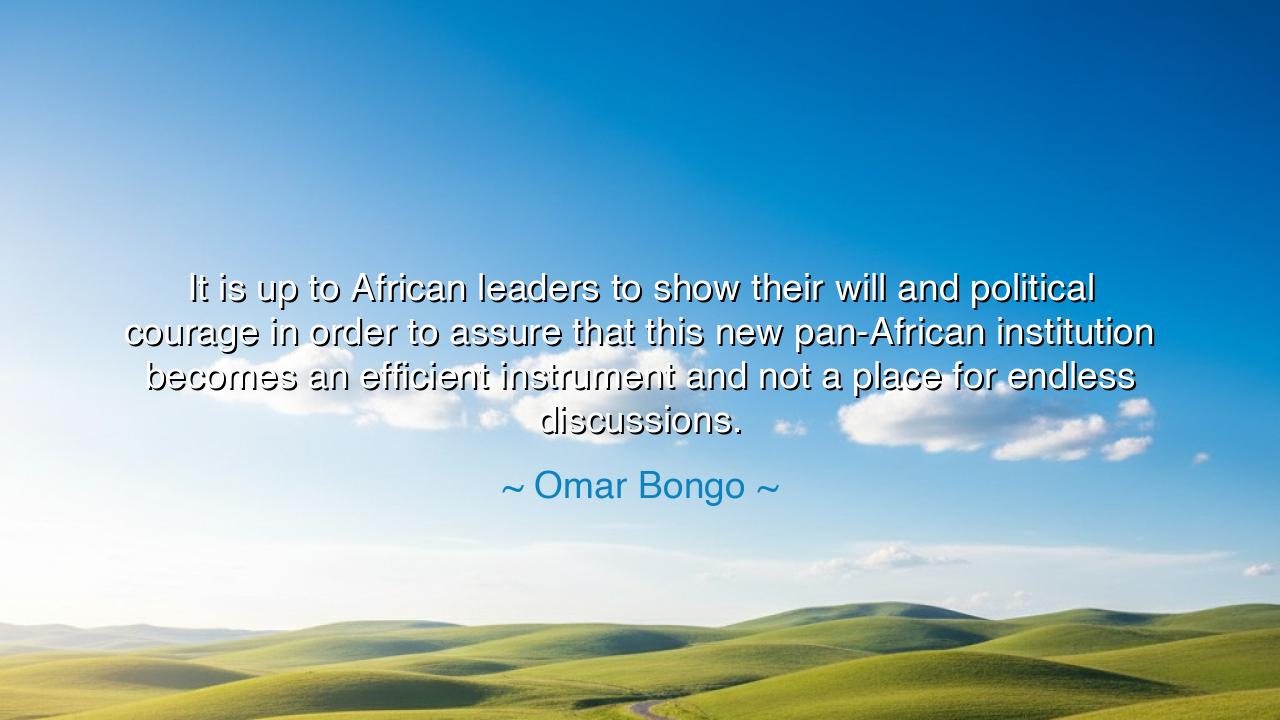
It is up to African leaders to show their will and political
It is up to African leaders to show their will and political courage in order to assure that this new pan-African institution becomes an efficient instrument and not a place for endless discussions.






“It is up to African leaders to show their will and political courage in order to assure that this new pan-African institution becomes an efficient instrument and not a place for endless discussions.” Thus declared Omar Bongo, one of Africa’s long-serving statesmen, whose words echo across the corridors of time as both warning and summons. In this proclamation, he calls upon the guardians of nations to awaken to their sacred duty — to wield courage not in speeches or ceremony, but in action; to transform unity from a dream into a living, breathing power. For Bongo spoke in an age when Africa, newly unshackled from colonial chains, stood upon the threshold of destiny, and yet, too often, stumbled under the weight of division and delay.
The origin of these words lies in the dawn of a new vision — the birth of a pan-African institution, a union meant to bind the continent together not by rhetoric, but by shared resolve. The dream of Pan-Africanism was not new; it had been carried by giants such as Kwame Nkrumah, Julius Nyerere, and Haile Selassie, who saw in the unity of Africa the promise of strength, dignity, and freedom from foreign dominance. But Bongo, speaking as both witness and participant, understood that institutions are not sustained by dreams alone. Without political courage, even the noblest vision withers into bureaucracy, and councils of promise become “places for endless discussions” — where men talk of justice but fail to act upon it.
In these words, Bongo exposes a universal truth: institutions are only as strong as the hearts that guide them. The architecture of progress is built not from marble or law, but from will. Many can debate, few can decide; many can speak, but only the brave can act. The will to serve the people, the courage to make difficult choices, the discipline to uphold the good even when it is unpopular — these are the fires that forge a nation’s destiny. Without them, councils become echo chambers, and visions fade into dust.
Consider the tale of Nelson Mandela, who embodied the very political courage Bongo demanded. When apartheid crumbled and the new South Africa stood uncertain before the future, Mandela faced a choice that would define a generation. He could have yielded to vengeance, but he chose reconciliation. He could have clung to power, but he stepped aside in peace. His leadership did not end in words; it was manifested in restraint, in forgiveness, in faith in his people. Through action, he turned ideals into living institutions. Such is the difference between the statesman and the politician: the one speaks to be heard, the other acts to heal.
But Bongo’s warning extends beyond Africa. It speaks to all nations, all ages, and all endeavors of humanity. How often do societies create assemblies, committees, and unions that promise greatness, only to be ensnared by their own inaction? The same disease — endless talk, no transformation — afflicts homes, communities, and hearts. For what is true of governments is true of men: the difference between stagnation and progress lies in will and courage. Without these, every gathering becomes a monument to what might have been.
Africa, the cradle of humanity, has always held within her soil the seeds of greatness. Her challenge, as Bongo saw, was never a lack of intelligence or resource, but of unity — unity of purpose, unity of action, unity of heart. To build a new pan-African institution worthy of the continent’s heritage requires leaders who dare to rise above personal gain and partisan pride. It requires the spirit of the lion, not the chatter of birds. For talk may fill the air, but only courage builds the future.
Therefore, my children, take this teaching to heart: whether in nations or in your own life, resolve without courage is a corpse without breath. Speak less and act more. Do not linger in the comfort of endless deliberation when duty calls for decision. Let your will be steadfast and your courage unwavering. For history honors not those who spoke most eloquently of change, but those who dared to make it real.
And so let the words of Omar Bongo echo like a call to awakening: “It is up to leaders to show their will and political courage.” Whether you lead a nation, a community, or your own soul, do not let your vision die in discussion. Let it rise in action. For only through courage does hope take form, and only through will does destiny find its way.






AAdministratorAdministrator
Welcome, honored guests. Please leave a comment, we will respond soon